Live Reporting
Edited by Andrew Humphrey and Rorey Bosotti
When is the next general election?published at 12:36 British Summer Time
The new rules mean that 16 and 17-year-olds can now vote in general elections, starting from the next one.
That is due to be held by August 2029 at the latest, as the maximum term for parliament is five years from when it first formed.
But the prime minister does have the option of calling one early if they choose to.
'Landmark moment for democracy' - National Union of Studentspublished at 12:32 British Summer Time
The National Union of Students (NUS) has welcomed today's announcement to lower the voting age, describing it as a "landmark moment for democracy".
Vice President Further Education at NUS UK, Qasim Hussain, says the decision has been achieved "by the tireless campaigning of generations of 16 and 17-year-olds who missed out on their chance to have a say in major democratic moments in the UK".
"The young people who have been empowered today pay taxes if they work and are significantly impacted by political decisions on education, the minimum wage, climate and more. They will now have a say on these issues and how their taxes are spent," Hussain says.
Labour policy 'hopelessly confused' - shadow ministerpublished at 12:25 British Summer Time
Becky Morton
Political reporter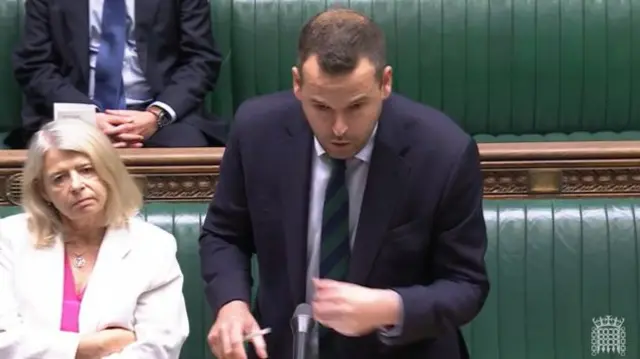 Image source, UK Parliament
Image source, UK ParliamentWe can now bring you more comments from Conservative shadow minister for Housing Paul Holmes reacting to today's announcement.
Speaking in the Commons, he says the government's position on the voting age was "hopelessly confused".
"Why does this government think a 16-year-old can vote but not be allowed to buy a lottery ticket, an alcoholic drink, marry, or go to war, or even stand in the elections they're voting in?" he asks.
He also suggests that allowing bank cards as voter ID could "undermine the security of the ballot box".
Voting age plan was in Labour manifesto - but not in first King's Speechpublished at 12:20 British Summer Time
Image caption,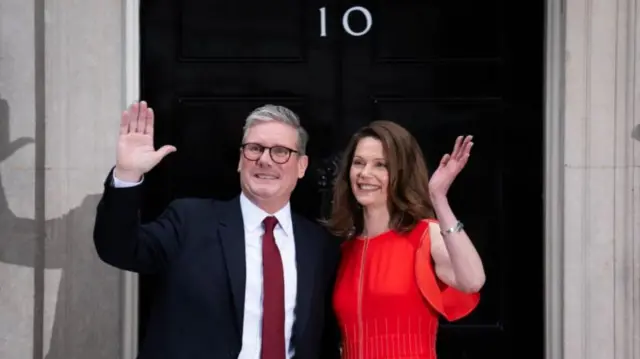 Image source, PA Media
Image source, PA MediaKeir Starmer and his wife Victoria after Labour won the 2024 general election
Labour’s manifesto for the 2024 general election pledged to give "16 and 17-year-olds the right to vote in all elections".
Of course, Labour won that election - but there was some doubt the commitment would be fulfilled when the changes weren’t included in the 2024 King’s Speech, which outlined the government’s early priorities.
Pressed on why lowering the voting age wasn’t in the speech, minister Lucy Powell said at the time there were "plenty of big bills that didn’t make it".
She stressed it remained a manifesto commitment – and now the government says "an elections and democracy bill during this Parliament" will deliver the changes before the next general election.
'Reforms open the door for millions more to get involved in elections,' Electoral Commissionpublished at 12:14 British Summer Time
The CEO of the Electoral Commission has hailed the reforms which will "improve the resilience and integrity of our electoral system".
Vijay Rangarajan adds: "Registration reform would open the door for millions more to get involved in elections, and the proposed changes to the political finance rules would strengthen the checks on money coming into UK politics and ensure a more proportionate and effective enforcement regime.
“We are ready to work with the electoral community to build understanding and compliance with any new requirements, and to support voters with information and education resources.”
At a glance: Four key changes proposed by the government - including bank cards as IDpublished at 12:05 British Summer Time
We have been poring over the details of what is in today's government announcement.
Here are the key takeaways:
- Voting age: Around 1.5 million 16 and 17-year-olds will be eligible to vote at the next general election
- Expansion of acceptable IDs: UK-issued bank cards will become legitimate forms of voter ID in Great Britain, providing the bank card displays the elector’s name
- Improving postal votes: The government is proposing a change to the deadline in Great Britain to apply for a postal vote, from 11 to 14 working days before a poll. This will align with the existing deadline in Northern Ireland. The idea is to get an "improved likelihood" of people getting their ballot in good time
- Changes to party donations: To tackle foreign interference, the government says it plans to tighten rules on political donations including on checks on contributions over £500 from unincorporated associations and closing loopholes used by shell companies
'It's only right' to give 16-year-olds right to vote, Rayner sayspublished at 12:01 British Summer Time
Deputy Prime Minister Angela Rayner says they are "delivering on our promise" on the lower voting age.
"Young people already contribute to society by working, paying taxes and serving in the military," she writes in a post on X.
"It's only right they can have a say on the issues that affect them."
Lib Dems welcome proposals but fear 'Elon Musk-shaped hole' in planspublished at 11:55 British Summer Time
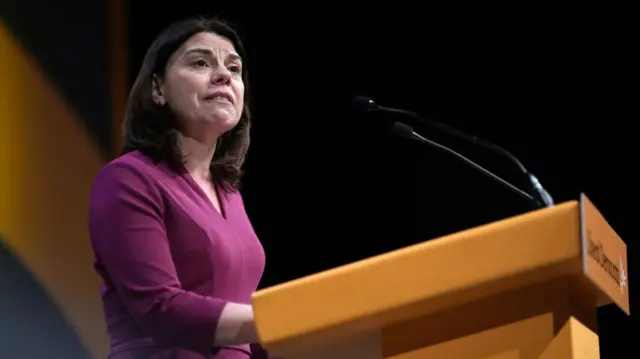 Image source, Getty Images
Image source, Getty ImagesWe've some reaction to bring you from the Liberal Democrats, who say changing the minimum voting age to 16 is a "no-brainer".
MP Sarah Olney says her party has campaigned for this change for "well over 30 years" and so welcomes the decision.
But, she says there is an "Elon Musk-shaped hole" in the proposed changes, and suggests that the government should "go much further to close the door to foreign oligarchs interfering in British politics".
For context: Tesla and X owner Elon Musk has been accused of intervening in UK politics after he shared a number of unsubstantiated claims on grooming gangs, and asked whether America should "liberate the people of Britain from their tyrannical government" in one social media post.
Farage says he's against lowering voting agepublished at 11:50 British Summer Time
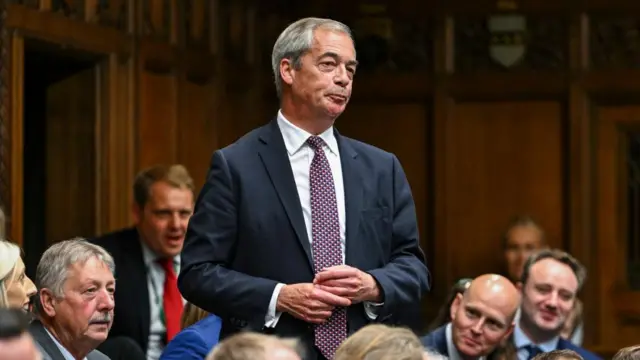 Image source, PA Media
Image source, PA MediaNigel Farage, leader of Reform UK, says he doesn't support lowering the voting age to 16 "even though we get lots of votes".
Speaking to ITV News, Farage says someone shouldn't be able to vote in an election unless they're able to stand as a candidate. A candidate must be at least 18 to stand for election.
"I'm really encouraged by the number of young people that are coming towards us," he adds.
Do the changes affect you? Send us your thoughts and questionspublished at 11:43 British Summer Time
Does lowering the voting age affect you? What are your questions about the changes?
You can contact us in the following ways:
- Email [email protected], external
- WhatsApp: +44 7756 165803
- Tag us on X: @BBC_HaveYourSay, external
- Please read our terms & conditions and privacy policy

Voting at 16 was nerve wracking, but empoweringpublished at 11:42 British Summer Time
 Imogen James
Imogen James
Live reporterUnlike most of my colleagues in the BBC newsroom sitting next to me, I have the perspective of voting at 16, as I grew up in Scotland.
I voted in my first Scottish parliamentary election in 2016, a year after they changed the law to lower the age.
It’s one of the few countries in the world that has the lower age for voting, along with Wales, Argentina and Belgium, to name a few.
I remember the nervousness of holding my ballot paper and walking into the village hall, asking my mum for help on what to do and where to go.
But, it was exciting too. I could put my thoughts somewhere to try and make a difference, to be taken seriously.
School was fun - we discussed politics among ourselves, something I'm not sure we had really done before outside of the classroom.
Not everybody voted, but a lot of us did.
And it taught me from a younger age to learn about the people in charge, and to take it seriously.
What other measures are being introduced?published at 11:37 British Summer Time
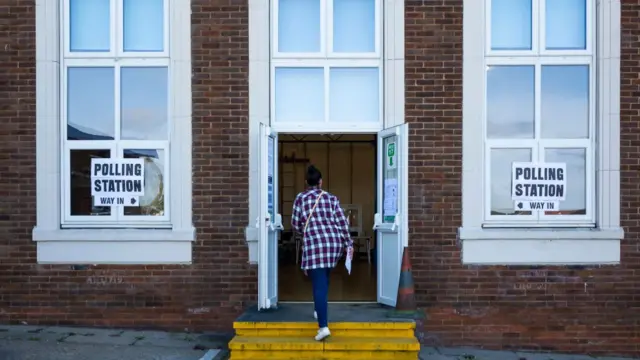 Image source, Getty Images
Image source, Getty ImagesAs well as lowering the voting age to 16, the government is also planning a host of other changes to the electoral system as part of a new Elections Bill.
These include expanding forms of voter ID to include UK- issued bank cards which display the voter's name.
Some 4% of people who did not vote at last year's general election said this was because of voter ID rules, according to the Electoral Commission.
Democracy Minister Rushanara Ali said the government would ensure this was done gradually "to make sure there aren't any risks of abuses or things going wrong".
The changes also include moving towards automatic voter registration, and tightening rules on political donations to protect against foreign interference.
Currently political parties can only accept donations from individuals registered on a UK electoral register or UK-registered companies which carry out business in the country.
However, there have been concerns that foreign nationals could get around the rules by donating through a foreign company that is registered in the UK.
No chance for Parliament to scrutinise changes until September, Tory MP sayspublished at 11:26 British Summer Time
Tory MP Paul Holmes has hit back at the government's announcement while speaking in the Commons this morning.
"There will be no opportunity for parliamentary scrutiny until September due to the recess," Holmes says.
He also asks the democracy minister why the policy was not announced in the Commons.
Rushanara Ali reiterates Labour ran on a manifesto which pledged to give voting rights to 16 and 17-year-olds, adding: "The truth is young people deserve to have a stake."
Starmer: If you 'pay in' you should get a say on how your money is spentpublished at 11:23 British Summer Time
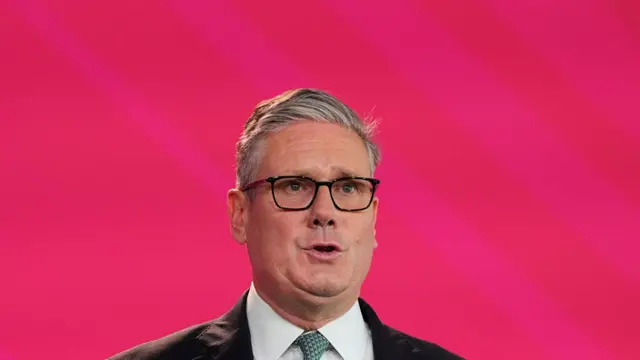 Image source, Getty Images
Image source, Getty ImagesPrime Minister Keir Starmer says lowering the voting age to 16 across the UK will give young people a chance to have their say on what their taxes are used for.
"I think it's really important that 16 and 17-year-olds have the vote, because they are old enough to go out to work, they are old enough to pay taxes, so pay in," he tells ITV News.
"And I think if you pay in, you should have the opportunity to say what you want your money spent on, which way the government should go."
Voter ID to be extended to UK bank cards under planspublished at 11:10 British Summer Time
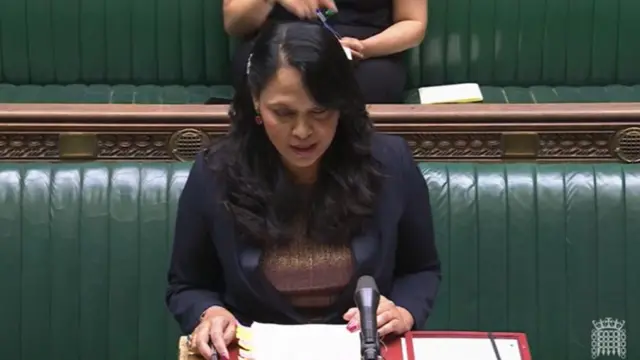 Image source, UK Parliament
Image source, UK ParliamentMore now from Democracy Minister Rushanara Ali, who confirms the government is planning to lower the voting age to 16 in time for the next general election.
This is due to take place by 2029, but could be called earlier.
"At 16, a young person can work, they pay taxes, they can join the Army. So there's no reason why from that age, they shouldn't have a say in who governs our country," she says.
Other changes announced today include expanding forms of voter ID to include UK-issued bank cards, moving towards automatic voter registration and tightening rules on political donations to protect against foreign interference.
We'll bring you more details on those changes shortly.
Biggest change to the electorate since 1969published at 10:59 British Summer Time
A pledge to lower the voting age to 16 was included in Labour's election manifesto but it did not feature in last summer's King's Speech, which sets out the government's priorities for the months ahead.
The minimum voting age is already 16 for local council elections in Scotland and Wales and elections to the Senedd and Scottish Parliament.
However for other elections, including to the UK Parliament, local elections in England and all elections in Northern Ireland, it is 18.
Lowering the voting age to 16 across the UK would be the biggest change to the electorate since it was reduced from 21 to 18 in 1969.
Voting age to be lowered to 16 by next general electionpublished at 10:52 British Summer Time
Breaking
Around 1.5 million 16 and 17-year-olds will be able to vote at the next general election, under government plans to lower the voting age.
Democracy Minister Rushanara Ali tells the BBC the "seismic" change will ensure young people's voices are heard.
She confirms the pledge will be part of a raft of measures introduced through a new Elections Bill.
We'll bring you live updates, analysis and reaction, so stay with us.
.png)



